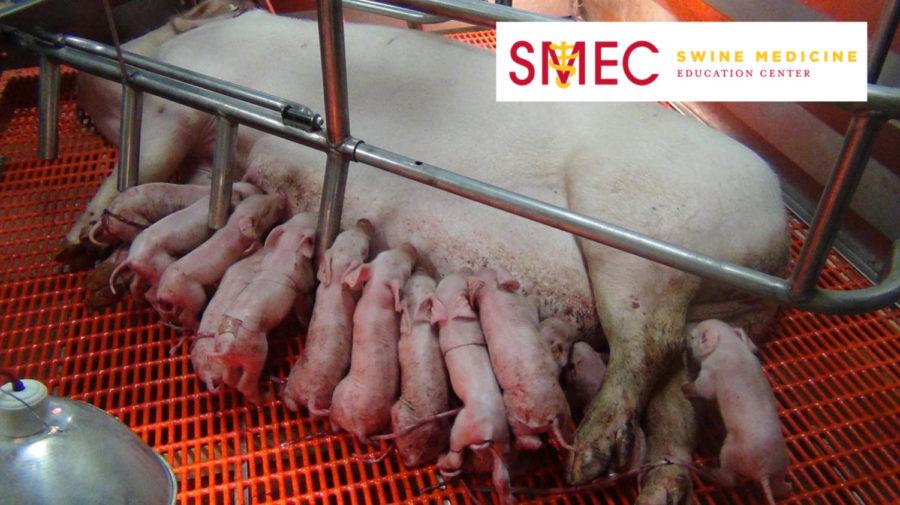Research team attempts to develop pain medication for piglets
January 28, 2015
Groundbreaking research done at Iowa State could lead to happier and healthier piglets, thanks to pain medication administered via their mothers’ milk.
A research team at Iowa State, in collaboration with the Swine Medicine Education Center, has been researching pain medication administration to nursing piglets through their mothers’ milk to address public concern of animal welfare.
“Often times, [consumers] are quite surprised to hear that we do procedures like dehorning and castration in cattle or castration and tail docking in piglets without any type of pain relief,” said Dr. Hans Coetzee, professor of veterinary diagnostic and production animal medication.
In 2014, Tyson Foods sent a letter to pig producers, informing them Tyson wanted producers to start addressing pain associated with tail docking and castration of piglets.
Tail docking prevents other pigs from biting the tails of surrounding piglets, potentially causing serious injuries. Male pigs are castrated to ensure high quality meat taste and texture. Both are done while piglets are still nursing.
“We run the risk of losing credibility with consumers when they’re made aware of the fact that we don’t do things that they assume we do,” Coetzee said. “The regular consumer, the one that would buy [the] products on a day-to-day basis, needs to have confidence that we produced it in a way that’s ethically responsible.”
Coetzee explained that to date the FDA has no approved pain medications to be administered to food producing animals in the United States.
“The reason why there are no approvals is because the FDA requires validated methods of measuring pain,” Coetzee said.
Coetzee said many of the measured behavioral outcomes are subjective, making it difficult to determine the effectiveness of the pain medication.
With the increased focus on animal welfare and ethics, the idea behind administering pain medication via the mother’s milk became a topic worthy of investigation.
Dr. Jessica Bates, a postdoctoral research associate, worked with Coetzee as part of the research team. Bates has several years experience practicing as a large animal vet in the state of Iowa.
“People get really sensitive about castration and tail docking,” Bates said. “It’s a stressful event in a pigs life.”
Coetzee, Bates and colleague Locke Karriker, an associate professor of veterinary diagnostic and production animal medicine, have been working on research and analysis for about two years. The researchers gave the mother pig — a sow — meloxicam, a non-steroidal anti-inflammatory drug that is similar to aspirin. Meloxicam reached the piglets through their mothers’ milk.
“It is efficient to medicate a sow and medicate her entire litter at once,” Bates said. “If an animal is in less pain, it produces better.”
Coetzee was the primary researcher to analyze data collected from the trial. Coetzee used specialized technology to detect drugs in collected blood samples from piglets and milk and blood samples from the sow.
Coetzee is hopeful pig producers will choose to use meloxicam for pain relief when castrating and tail docking piglets if they can profit on the investment. While meloxicam is used outside the United States, it is not among FDA approved drugs to be used in food producing animals.
However, it is unlikely that swine farmers will be able to begin medicating piglets with meloxicam anytime soon, the researchers said.
“Unfortunately, there are a lot of hoops to jump through,” Bates said. “Getting a drug labeled for use can take years.”
Researchers are confident future studies will provide conclusive information regarding the dosage and withdrawal time, which is the time it takes for the drug to leave the animal’s body.
“It was a really exciting study to be a part of,” Bates said. “We are taking better care of livestock by controlling their pain.”
Greg Krahn, manager at the Swine Teaching Farm and graduate student, understands the impact the research could have on production swine farms.
“We are always looking for the best for the animal,” Krahn said.
The research may help the meat production industry to get ahead of issues about castration and tail docking, which PETA and the Humane Society have highlighted as areas of concern.
Coetzee said using pain relief medication is one way to assure consumers have confidence that we are doing the right thing by the animal.
Updated at 3:27 p.m.

















